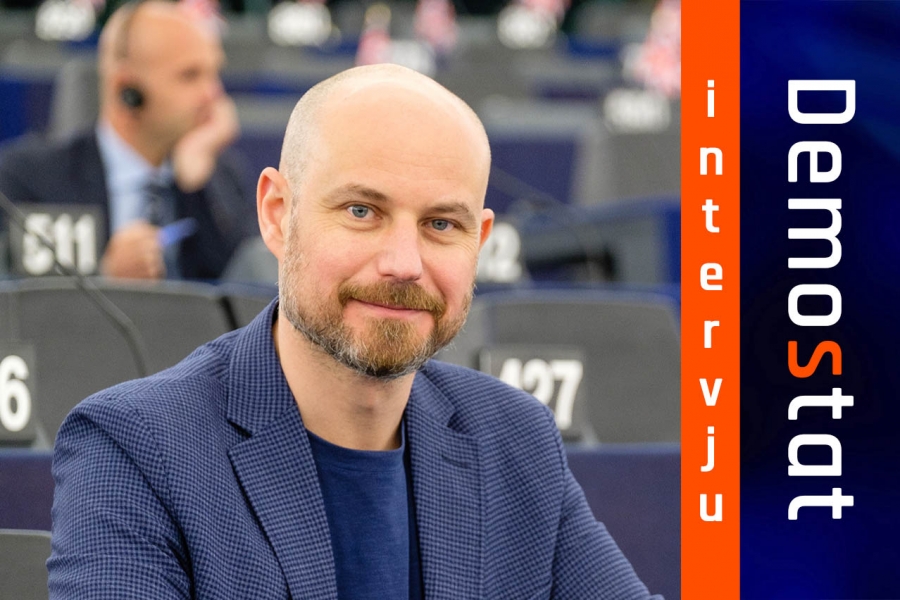It is important that all relevant actors in the country work towards making sure that the campaign in the run-up to elections, once they are announced, is free and fair.
The EP Report on Serbia mentions the pressure on independent media outlets, the Russian interference in Serbia’s media companies as well as disinformation spread by relevant media, which unfortunately contributes to anti-EU public sentiment. My report also suggests that Serbia should improve media pluralism in the country, promote quality investigative journalism and increase transparency of media ownership and financing.

It is important that all relevant actors in the country work towards making sure that the campaign in the run-up to elections, once they are announced, is free and fair.
The EP Report on Serbia mentions the pressure on independent media outlets, the Russian interference in Serbia’s media companies as well as disinformation spread by relevant media, which unfortunately contributes to anti-EU public sentiment. My report also suggests that Serbia should improve media pluralism in the country, promote quality investigative journalism and increase transparency of media ownership and financing.

As we announced during our last visit to Belgrade in June this year, The European Parliament is fully committed to continuing the Parliamentary Dialogue Process in Serbia. I am glad that we have received the same commitment from the leadership of the Serbian parliament and representatives of political parties in the National Assemly, says Vladimir Bilcik, the European Parliaments rapporteur for Serbia, who also served as a mediator in previous phases of inter-party dialogue on improving electoral conditions in Serbia.
Bilcik, a member of the European Peoples Party (EPP), the largest group in the European Parliament, specifies: "In the coming weeks we are going to engage in discussions on how we can best continue with the next steps in the Parliamentary Dialogue Process."
DEMOSTAT: In your opinion, is there enough time to improve the election conditions in Serbia, given the fact that early parliamentary elections will probably be held in our country soon?
There is always time and space to improve the conditions for elections. The issues which are outstanding have been well known since the last elections. It is important that all relevant actors in the country work towards making sure that the campaign in the run-up to elections, once they are announced, is free and fair.
DEMOSTAT: What is your view on the request by the Serbian opposition parties that the new elections should be organised as early as in December?
The decision on holding early elections is in the hands of the relevant constitutional authorities. It is important politically that any decisions when it comes to representative democracy in Serbia lead to a situation which allows for a less divisive and less polarised public atmosphere and is also conducive to reforms, which are vital for progress on Serbia’s path towards the European Union.
DEMOSTAT: What do you think about the decision by some opposition parties in Serbia to block the National Parliament?
As a Member of the European Parliament and as one of the co-facilitators in the Inter-parliamentary Dialogue, that has now been transformed to the Parliamentary Dialogue Process, I can only say that any decisions which undermine the work of the parliament are no good news for the parliamentary democracy. I hope that all elected political parties and their representatives can work in a functioning parliament.
DEMOSTAT: According to media reports, the EP will serve again as the mediator in the interparty dialogue in Serbia. When will it be decided?
As we announced during our last visit to Belgrade in June this year, The European Parliament is fully committed to continuing the Parliamentary Dialogue Process in Serbia. I am glad that we have received the same commitment from the leadership of the Serbian parliament and representatives of political parties in the National Assemly. In the coming weeks we are going to engage in discussions on how we can best continue with the next steps in the Parliamentary Dialogue Process.
DEMOSTAT: What is your assessment of the media situation in Serbia?
I think the best answer to this is provided by my latest report on Serbia adopted by the European Parliament in May this year. Everyone can find and read the report on the website of the European Parliament: https://www.europarl.europa.eu/doceo/document/A-9-2023-0172_EN.html The report mentions the pressure on independent media outlets, the Russian interference in Serbia’s media companies as well as disinformation spread by relevant media, which unfortunately contributes to anti-EU public sentiment. My report also suggests that Serbia should improve media pluralism in the country, promote quality investigative journalism and increase transparency of media ownership and financing.
DEMOSTAT: What do you think about the latest Brussel’s meeting between Vucic and Kurti?
It is important that the dialogue between Belgrade and Pristina continues, but it is even more important that it brings results. As I already said before, the ball at the moment is very much in the hands of Pristina. Pristina should unblock the process leading up to the establishment of the Association of Serbian municipalities as well as cooperate on finding a practical solution so that new elections can be held in northern Kosovo.
DEMOSTAT: What do you think about the year 2030 as the possible date for the membership of the Western Balkans in the EU?
I am convinced that it is a signal that the European Union is ready and committed to the next enlargement and those, who are going to be ready to join the European Union, are going to be able to do so. Therefore, rather than discussing any specific dates at the moment I would focus on delivering the reforms, on moving ahead the dialogue between Belgrade and Pristina and on aligning with the European Union in all policy areas, including external relations. These, in my opinion, would be the best signals that Serbia is ready to join the European Union as soon as possible.
In all societies there are issues that are rather being skipped. Certain...
The neoliberal path, started in 2001, has led to especially bad results in Serbi...
For centuries, the region was subsumed within the Ottoman and Hungarian Empires,...
"Serbia has returned to the systemic and anti-systemic position of the political...
In reality, Serbia is closer than ever to NATO. In the course of the last five y...